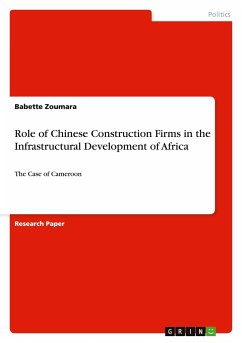Research Paper (postgraduate) from the year 2013 in the subject Politics - International Politics - Region: Africa, grade: noe, , course: China-Africa Relations, language: English, abstract: Embedded in the Addis Ababa Action Plan formulated by China and Africa is the commitment to infrastructural development. Through many of its state-owned enterprises (SOEs) and construction firms, China has built over 20 demonstration centers for agricultural technology, about 30 hospitals, 30 malaria centers and over 150 schools all over Africa. In Cameroon, Chinese construction firms within the past decade under took several construction projects aimed at improving the infrastructural situation of the country. In fact, their presence is obvious in almost all spheres of life: from the construction of road network and stadia through the construction of hospitals, schools, improvement of communication network and the provision of affordable housing, to the construction of dams for electricity supply and the provision of portable drinking water. China through these firms has truly improved the infrastructural situation of Africa in general (both proponents and critics agree on this) ad Cameroon in particular, and has thus propelled the country for economic growth and development. The contribution of Chinese construction firms to the infrastructural development of Africa has been reported in literature. However, this paper examines the presence of these firms in Cameroon not only to highlight the diversity of their operations but to participate in the ongoing debate on the motives behind their quest so as to echo the impact of their contributions on all sectors of the Cameroonian economy; and most importantly on the lives of the citizenry.
Hinweis: Dieser Artikel kann nur an eine deutsche Lieferadresse ausgeliefert werden.
Hinweis: Dieser Artikel kann nur an eine deutsche Lieferadresse ausgeliefert werden.








